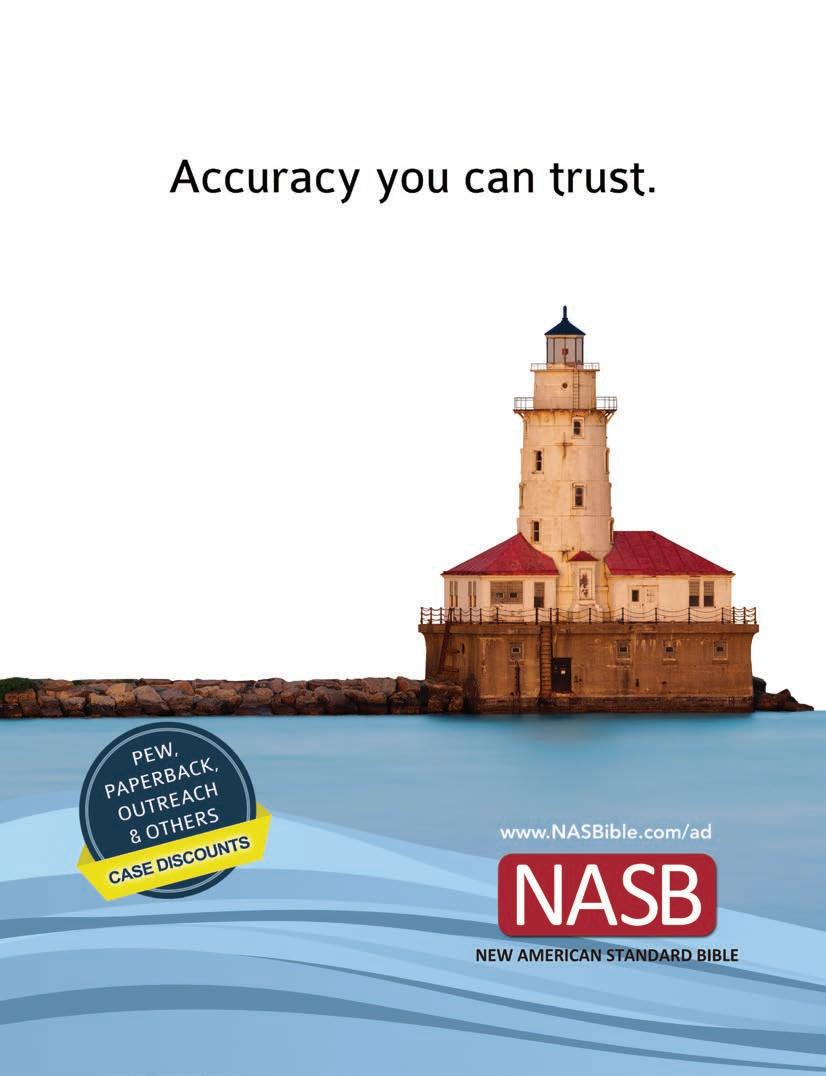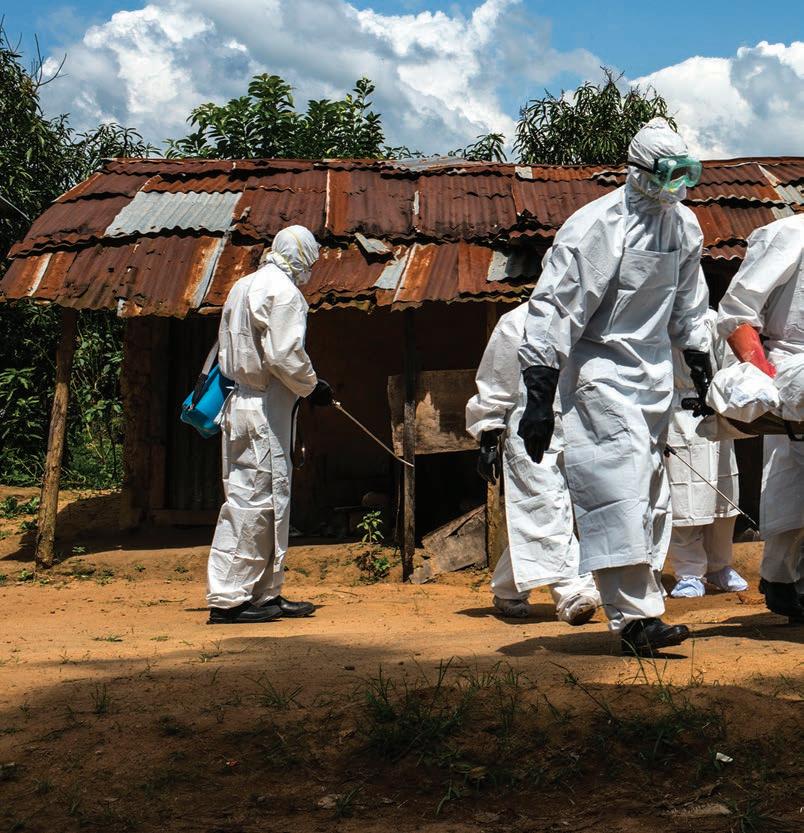
41 minute read
Five years after Ebola
One small mission hospital in Liberia saved lives and paved the way for better healthcare in Africa BY EMILY BELZ IN MONROVIA, LIBERIA
PHOTO BY MICHEL DU CILLE/ THE WASHINGTON POST VIA GETTY IMAGES
Advertisement
3 b As clouds dumped late summer rain in Liberia, William E. Pewee was on his way to work as registrar at the Eternal Love Winning Africa (ELWA) Hospital, a 54-year-old mission hospital in the capital city of Monrovia. Although he claims not to be a good singer, before his day started Pewee sang a song of worship to God. He’s thankful to be alive. Five years ago, he was lying sick on a hospital bed at ELWA, bleeding from his eyes, ears, and nose. He’d contracted Ebola, a dangerous virus that swept the country in 2014
EBOLA
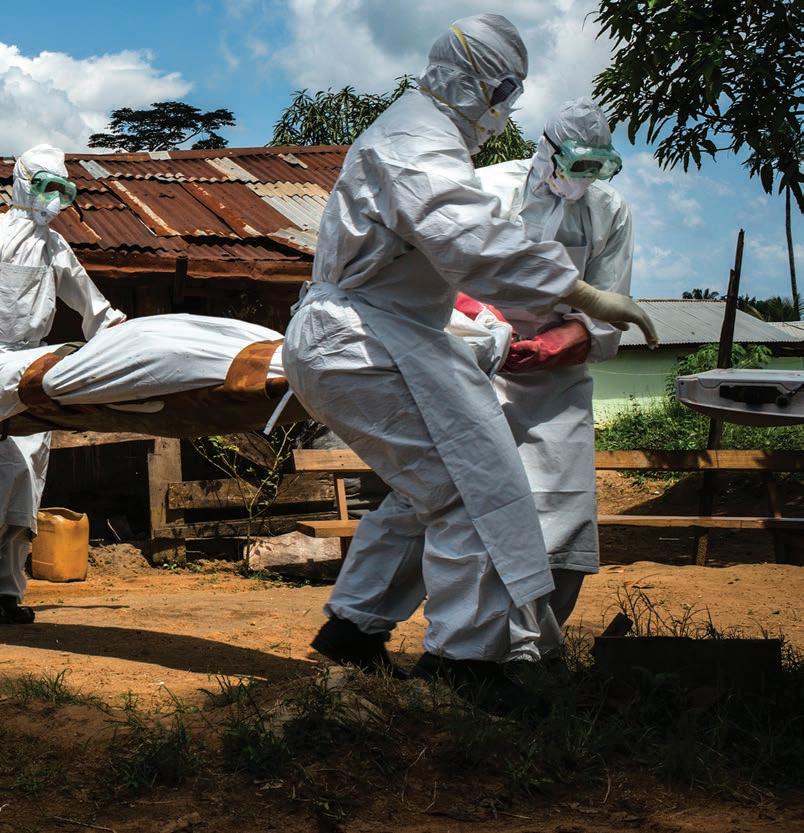
A county health burial team in Liberia in 2014 carries away the body of a woman suspected of dying from Ebola.
and killed thousands of people. Pewee picked up the contagious virus while praying with an ELWA patient who turned out to be positive.
Dr. Rick Sacra also caught the virus from an ELWA patient. The longtime missionary doctor, an American who had worked at the hospital since the 1990s when staffers were treating gunshot wounds from the country’s civil war, became a patient himself during the Ebola outbreak. Today, the room where Sacra was treated for Ebola is now a cramped hospital study library. Inside, when I visited, Sacra was working with ELWA medical residents on a PowerPoint presentation regarding a case of palpable purpura. The residents discussed vasculitis, adjusted font sizes, and boiled hot water for tea to stay awake.
In the hospital’s new dental clinic, clinic manager Loranso Gbogar was taking phone calls. During the Ebola outbreak,
Rick Sacra makes his morning rounds at the ELWA maternity ward in 2015.

Gbogar came down with typhoid, and ELWA was the only hospital taking patients like him. Much of the devastation of Ebola was that other diseases and conditions went untreated as hospitals and clinics closed.
Though Pewee, Sacra, and Gbogar recovered, many others did not. The virus killed 11,000 in West Africa from 2014 to 2016, the largest Ebola outbreak in history. Liberia bore the heaviest burden of fatalities.
Amid this crisis, ELWA Hospital, run by Serving in Mission (SIM), opened the country’s first Ebola treatment unit and became one of the primary treatment centers for the disease. Without this small mission hospital, many people— not just Ebola sufferers but other patients needing emergency cesarean sections or treatment for deadly fevers—would not be here today. Not only did ELWA’s medical workers weather the epidemic, they went on to contribute to the development of life-saving treatments. The hospital is now helping rebuild local institutions and training new health workers at a time when Ebola is on the move again in Africa—a yearlong outbreak in the Democratic Republic of Congo has so far killed about 2,000.
It’s easy to forget how much panic Americans felt about the spread of Ebola in 2014, panic that could have derailed clinical care and breakthrough research. Workers at New York’s LaGuardia Airport went on strike over fears about possible exposure to Ebola from travelers. Airport officials quarantined nurse Kaci Hickox, returning from treating Ebola patients in Sierra Leone, even though she had tested negative for the virus.
During that time, Republican politicians in the United States called for a travel ban on West Africa. At one point, the governors of New York and New Jersey ordered all health workers returning from the Ebola zone to be quarantined for three weeks upon arrival in the United States, hampering health workers from going to serve in the crisis. Donald Trump, not a candidate at the time, took to social media to condemn President Barack Obama for sending “innocent soldiers” to West Africa and to call for a ban on flights from West Africa to the United States.
Sacra and other doctors argued a travel ban would hurt clinical care and research in West Africa, ultimately hurting other countries as the virus spread with few medical workers
GUINEA 2,543
LIBERIA 4,809
SIERRA LEONE 3,956
DEMOCRATIC REPUBLIC OF CONGO 2,000+
DEATHS FROM EBOLA EPIDEMICS
SINCE 2014
SOURCE: WORLD HEALTH ORGANIZATION
to treat or contain it. The United States at one point even blocked Centers for Disease Control and Prevention (CDC) experts and other government personnel from working in Ebola-affected areas.
But later, CDC experts started a lab on ELWA’s campus. A partnership between U.S. federal health experts and the Liberian Ministry of Health has since resulted in the largestever studies on Ebola survivors and helped with the development of new vaccines.
Yet while U.S. politicians debated travel bans, ELWA hospital workers were risking their lives to treat the sick.
One was deputy nursing director Marthalyne Freeman. In the hospital’s emergency room this August, Freeman rushed a
dose of adrenaline to doctors who were performing CPR on a teenager. The boy had arrived at the hospital comatose, suffering from cerebral malaria.
Five years ago, Freeman was one of the few workers who volunteered to stay at her post to treat Ebola victims. Her own family asked her not to come home while she worked in the Ebola treatment unit (ETU), worried about the risk, so she slept in a vacant bed at the hospital. At that time, the outbreak was so bad that bodies were stacked in the streets for cremation.
“I woke up, and it was like a nightmare,” she remembered. At one point, a needle penetrated her protective gear and pricked her skin while she worked in the ETU, but she did not get sick. “I believe the Bible, but I did not feel the Bible. But when I went through the Ebola crisis, I felt the Bible. It was realistic. The reality of the Word was seen.”
Joshua Sweegaye, a staffer at the affiliated ELWA radio station, remembered asking Freeman, “Are you not afraid?” She answered him, “If we are all afraid, we will die.”
While Freeman was working in the ETU, her own daughter and son-in-law, Naomi and Dorbor Sirleaf, tested positive for Ebola. The hospital admitted the couple to the unit where Freeman worked.
Freeman would tell patients afraid of the isolation unit that her own daughter was in there. Dorbor’s sister, who accompanied him to ELWA, died next to him in the ETU. He lost most of his family to the virus, 14 in all.
In the hospital chapel this summer, Naomi and Dorbor gathered for a photo with their 8-year-old twins, named
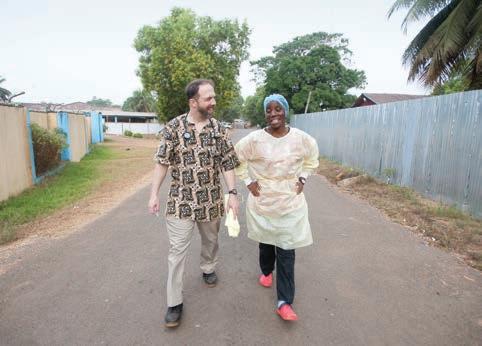
Praise and Praises, who were born in ELWA Hospital.
“We are the only few who are alive,” Dorbor said. “The only person who can comfort me is mother Marthalyne.” Survivors like Dorbor, as well as ELWA workers, faced stigmatization from fellow Liberians because of the horrific nature of the disease and how little understood it was. Dorbor recalled that his family members couldn’t draw water in their community for a while after their recovery. Nurses remembered that their neighbors avoided them because they worked at ELWA.
SIM is trying to help address this problem through its trauma healing program for survivors of Ebola. SIM missionary Nancy Writebol, who contracted Ebola while working at the hospital, now leads the program. Writebol and her Liberian counterpart Jeremiah Kollie have worked with everyone from the police to the men who staffed the muchhated cremation teams during the Ebola outbreak (see p. 57). Writebol has experienced stigma too, even in the United States: She recalled, after being declared Ebola-free and returning home, that someone from her home church put up her hand to keep her away, fearful of getting Ebola.
3 b Distrust of health workers has also been a hurdle to defeating the current Ebola outbreak in Congo, aside from the ongoing political violence there. About 200 health facilities have come under attack during the outbreak. Liberia has faced the same issue, but trust appears to have grown, even if patients still come to ELWA as a last resort. Dorbor Sirleaf said: “Now everyone prays for hospitals.”
When the Ebola virus hit West Africa, no treatment existed for it. But the 2014 outbreak spurred scientific research, which has lessened the severity of the Congo outbreak. Since the Liberian outbreak, medical researchers introduced new Ebola vaccines and are developing others. Writebol and Sacra both have given their antibody-filled blood to researchers working on solutions to Ebola.
Seven of those infected in the West Africa outbreak agreed to an experimental drug, ZMapp, which had only been tested on animals. Writebol was one of those seven. She remembers the ZMapp she received in 2014 was marked “not for human use.” Health workers have since used ZMapp to treat patients in Congo, lowering death rates by about 50 percent in one trial.
And now there’s a big breakthrough, better than ZMapp. Researchers just
A woman visits ELWA Hospital in August.

announced two new antibody drugs that have cured 90 percent of Ebola cases for those who get treatment early. The drugs, developed by two American pharmaceutical companies and the U.S. National Institutes of Health, could halt the Congo outbreak entirely.
The scientific discovery comes in part from Congo itself. The blood of a survivor of an outbreak in Congo in 1995 helped develop one of the new antibody drugs, and both drugs descend from decades of research by Congolese doctor Jean-Jacques Muyembe.
3 b As Congo fights its Ebola battle, ELWA Hospital’s Liberian staff is helping Liberian institutions rebuild: After the Ebola crisis, the Liberian government tapped ELWA medical director Dr. Jerry Brown to run JFK Hospital, the big government hospital in Monrovia. ELWA has become a teaching hospital, preparing Liberian medical workers to be on the front lines of the next health crisis.
While ELWA is mostly Liberian-run and self-sustaining, it has relied on outside capital to become a full-fledged teaching hospital. After the outbreak, Samaritan’s Purse built ELWA a new, larger hospital complex as well as housing for medical residents, and African Mission Healthcare is building hospital faculty housing and supporting the residency program.
Still, resources are always slim. Sacra estimates 11 experienced Liberian doctors died from Ebola, out of about 250 who were in the country at that time, undermining a health infrastructure that had just started rebuilding from 14 years of civil war.
Post-Ebola, the chaos of a limited health infrastructure remains part of ELWA workers’ everyday lives. They care for patients in kidney failure with no dialysis, for those with diabetes with no consistent insulin, for palliative patients abandoned by their families because the families can’t pay the hospital bills. The country has no intensive care unit, and it’s waiting on its first pathology lab that can do biopsies.
And ELWA has its own foibles and failures. The doctors there were frustrated for a full day by a lost key to the ultrasound room (the key turned out to be locked inside the room). Sacra stayed up until 1:45 a.m. one night writing out a remedial test for a flailing doctor in residency. At one point a hospital bed was broken, and the administrators hadn’t arranged for a replacement, so the ward was short a bed. Antony Cyrus Suah, a physician assistant who worked at ELWA during the Ebola crisis, said it was “more stressful than five years ago” because of the current demand for beds.
But those stresses lessen at the sight of someone healing. Ibrahim Ly, a young Muslim boy, came to the ELWA emergency room with cerebral malaria, a severe form of malaria with a poor prognosis. His uncle Mamadou Yéru Ly said they came to this hospital because “people told us it was good.” In the ER, the boy lay rigid, unable to move or speak, staring blankly at the wall. He lay there as another boy with cerebral malaria died next to him. But after two days in the pediatrics ward, Ibrahim was sitting up in bed, eating. The next day he was walking around, and the hospital discharged him, the geckos on the sidewalks scattering as he skipped out.
3 b The rest of the world has since moved on, but “the Ebola times,” as Liberians call them, still cast a shadow. The high-school graduating classes were small this year because the students started high school in the Ebola years when everything in the country shut down.
At the Liberian church on ELWA’s campus, a small tank of bleach water with a spigot stood outside for parishioners to wash their hands before a service—a practice that began in the Ebola times. At the worship service, a man giving announcements reminded everyone to keep up the practice of hand washing. This particular Sunday at the International Church of Monrovia, Sacra was on duty for intercessional prayer. He began by reading 2 Corinthians 4:16-18: “Therefore we do not lose heart. Though outwardly we are wasting away, yet inwardly we are being renewed day by day. …” He thanked God for the country’s peace of the last 15 years, and then prayed against the spread of Ebola in Congo.
“We praise you for the news this week of new treatments,” he said. “Bring the outbreak of Ebola to an end.” He concluded his prayer: “We present our bodies as living sacrifices this morning.” A chorus of amens rose up.
After church, he walked to the hospital to do rounds. A
Rev. Dr. Bassam Chedid President, Children Of Abraham Ministry
Many Muslims are asking for Bibles.
You can make an eternal investment by partnering with us to provide Bibles to Arabic speaking people.
Here’s how you can help. 1 Sponsor an Arabic Study Bible (ASB) to be placed in an Arab/Muslim home each month for $50 a month. 2 Purchase an Arabic Study Bible (ASB) and give it as a gift to your Arab friend. 3 Ask your church to partner with us.
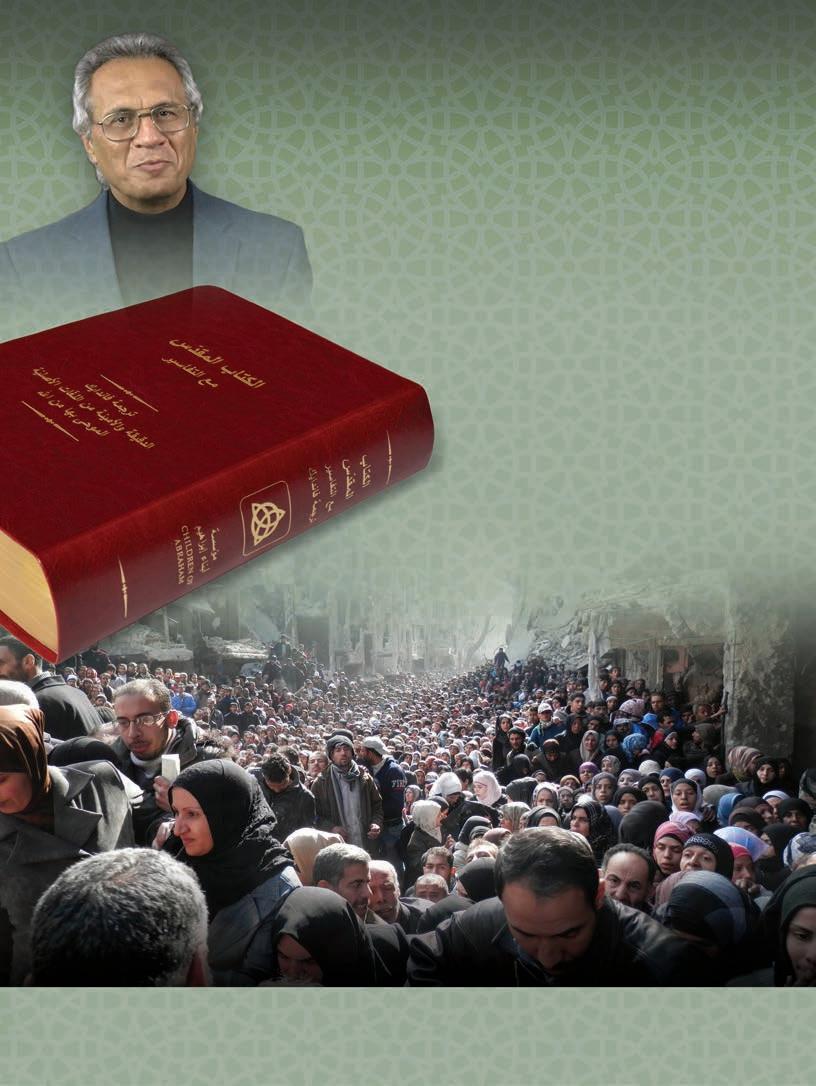
The Word of God and Theological Library in one volume, based on the timeless Van Dyck faithful translation from the original languages.
More Muslims have come to Christ in the last 50 years than in the previous 1400 years since Islam began and missionaries in the Middle East are asking for Bibles for Syrian refugees.
Fully Prepared. For His Purpose. MAKE THE MOST OF THE GIFTS YOU’VE BEEN GIVEN.
M.B.A. M.DIV. M.MIN. M.S.N. PHARM.D.
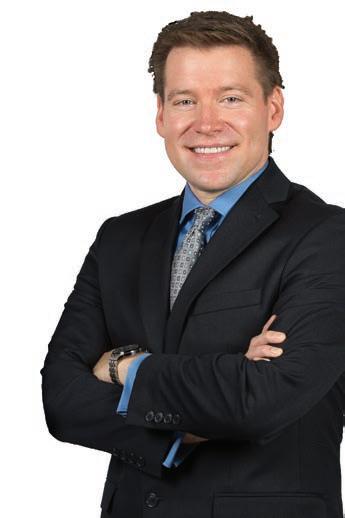
APPLY TODAY AT CEDARVILLE.EDU/ WORLDMAG

NOTEBOOK Technology / Health / Lifestyle
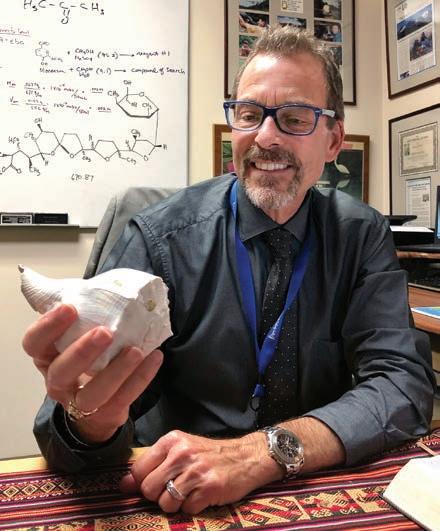
Technology The fake news police WHO FACT-CHECKS FACEBOOK’S FACT-CHECKERS? by Hannah Harris
RThe debate about bias at Facebook and other media intensified last month as investigators headed by former GOP Sen. Jon Kyl presented an “interim report.” Kyl’s Covington & Burling law firm interviewed 133 conservatives and heard concerns that Facebook’s third-party fact-checkers “skewed to the ideological Left.” The report, though, did not present any case studies to support those concerns, so WORLD examined one specific bias claim in an attempt to see how Facebook’s fact-checkers work. Before we get to our analysis, though, it’s important to understand the power Facebook has.
The basics: Many people get their news from social media instead of news websites. Facebook, given
charges of “fake news,” relies on five outside fact-checking groups: PolitiFact, the Associated Press, FactCheck.org, Science Feedback, and Check Your Fact. Conservatives often criticize the first four. The fifth is a subsidiary of the right-leaning Daily Caller. The International Fact-Checking Network (IFCN), part of the journalism think tank Poynter Institute, certifies the fact-checking organizations.
Individual fact-checkers at those organizations then rate posts social media users have flagged or that the fact-checkers themselves question. Facebook demotes in its news feed posts that contain (according to factcheckers) false claims or false headlines. That means fewer views, likes, and comments for the publisher. Demotions can turn into lost opportunities to advertise or monetize through Facebook, warnings on Facebook pages, and loss of designation as a news page.
Facebook, in short, forces news outlets to choose: remove the post or face heavy consequences. Professor Gregory Rummo with a conch shell that he found 10 miles from the coast.
R Our case study begins in July when chemistry professor Gregory Rummo learned via Twitter that Townhall.com, a conservative news site, had retracted
his recently published column, “Apocalyptic Sea-Level Rise—Just a Thing of the Past?”
Rummo was surprised. A week earlier a Townhall.com editor had emailed him to say a Facebook fact-checker had flagged his column as “false news.” Rummo sent the editor information to validate the article and assumed that would resolve the issue. But it didn’t.
Facebook ordered Townhall.com to remove Rummo’s article because of the “false news” flag.
If Townhall.com refused, it could face the penalties Facebook levies against “false news” publishers: demoted posts. No designation as a news page. No ability to make money through ads. Rummo writes for the Cornwall Alliance, a group of Christian scholars and scientists known for their stance against “climate change alarmism.” The organization has about 200 articles published in various outlets per year, says Cornwall Alliance founder Calvin Beisner, but this is the first article to be retracted.
Townhall.com never told Rummo why it purged his article—not just from Facebook, but also from Townhall.com. Townhall.com editor Leah Barkoukis did say in an email to Beisner that Facebook “would not accept anything but a retraction,” even after Rummo and Beisner sent research to back up Rummo’s claims. Who decided Rummo’s column was false news? Climate Feedback, a division of Science Feedback, fact-checked Rummo’s article and posted the analysis to its website. According to the factchecker’s website, “The Science Feedback editor provides feedback to the journalists and/or editors of the outlet of the original article reviewed.” But Rummo never heard from Climate Feedback—other than a tweet boasting the article’s retraction with what Rummo called “lethal triumphalism.” It tagged Rummo and Palm Beach Atlantic University, where Rummo teaches.
Townhall.com replaced Rummo’s article with a note saying the column “incorrectly cited a graph.” But Rummo accurately referenced a graph that “shows two previous periods when temperatures were warmer than they are now,” namely the Roman Warm Period and the Medieval Warm Period. Rummo says his article, which focused on sea level rise, “wasn’t really breaking any new ground” by including the graph. If climate scientists disagree with the cited study’s findings, they should take issue with the study itself, Rummo says. Climate Feedback’s report calls Rummo’s citation of the graph “factually inaccurate” with “flawed reasoning” even though Rummo accurately stated what the graph showed. “It wasn’t really a fact that was incorrectly reported,” he said. “It was the fact that [Climate Feedback reviewers] don’t like.”
Climate Feedback subscribes to the IFCN code of principles, which requires a commitment to nonpartisanship, fairness, and an “open & honest corrections policy,” among other qualifications. Rummo and Beisner don’t consider the retraction nonpartisan or fair. The IFCN says it expects “factcheckers to be more committed to correcting the record than anyone else” and requires its members to have “robust corrections policies.”
Is it possible to appeal the decision? Technically, yes. Townhall.com would need to appeal to the fact-checkers that found issue with Rummo’s article. But the website hasn’t appealed. I asked Townhall.com editors about the decision, but they did not respond to my phone calls or emails. They seem to be A copy of the graph that Rummo used to validate the position taken in the article that Townhall.com retracted WHAT ARE THE FACTS? Facebook’s fact-checker considered nonfactual an article showing a graph indicating that the Roman Warm Period actually happened. He could have read an expert account on the matter by a distinguished professor of classics, with vetting by a major university press. In The Fate of Rome: Climate, Disease, & the End of an Empire (Princeton, 2017), Kyle Harper discusses why the two centuries on each side of a.d. 1 were so glorious for Rome. He gives considerable credit to global warming, or at least to the “Roman Warm Period” (also called the Roman Climate Optimum, or RCO). Contemporary comments, melted Alpine glaciers, tree rings, and other evidence left Harper believing that “warmth, precipitation, and stability characterized the RCO in the circum-Mediterranean.”
Harper also notes that high, stable solar activity and low volcanic activity contributed to Roman warmth. (Vesuvius was an exception.) Harper’s summary: “The climate was the enabling background of the Roman miracle. The RCO turned the lands ruled by Rome into a giant greenhouse.” Then cold centuries came, and “one of history’s most conspicuous civilizations found its dominion over nature less certain than it had ever dreamed.” —by Marvin Olasky 0.2 0.0 -.02 -.04 -.06 -.08 Temperature (°C) anomaly relative to the 1961-90 mean 2000180016001400120010008006004002001 Little Ice Age Thermometers Satellites *Ljungqvist, F.C. 2010. A new reconstruction of temperature variability in the extra-tropical Northern Hemisphere during the last two millennia. Geografiska Annaler: Physical Geography, Vol 92 A(3), pp. 339-351, September 2019. DOI: 10.1111/j1468- 0459.2010.00399.x Year AD
following the adage “Don’t poke the bear.”
Rummo also decided against appealing because he didn’t want to “stir up the hornet’s nest.” Whether or not fact-checkers agree with Rummo’s claims, Facebook’s ability to silence one side of an argument is alarming. And Rummo wasn’t even debating the amount or cause of global warming now: He was referring to a scholarly report on temperatures two millennia ago.
R What’s next? Last month Facebook gave fact-checkers free reign of Instagram as well. Instagram (which Facebook owns) will limit the audience reach of “false information” posts by downplaying them on the site’s “Explore” page. The concept is comparable to Facebook’s, except Instagram users won’t even be notified when their posts are flagged.
Facebook/Instagram now wields doubly dangerous authority. Its factchecking partnerships are intended to limit the spread of false news. But if fact-checkers are biased or just mistaken, they can stifle debate and even historical research that challenges current pieties.
Facebook last month announced new initiatives to address perceived anti-conservative bias: Four staff members will now deal with bias complaints. Facebook also announced it will appoint an oversight board with “a diverse range of intellectual viewpoints.” We’ll see whether that result is different from Google’s: When some on the left protested the appointment of Heritage Foundation head Kay Coles James to an ethics board, Google dissolved the board before it ever met.
Media Research Center President Brent Bozell denounced the Kyl report and Facebook’s response, calling it “nothing of substance.” But Kyl’s team promises additional reporting in several months: Kyl said, “There is still significant work to be done.” A
Health Scars to heal IN A COUNTRY RAVAGED BY WAR AND EPIDEMIC, AN AMERICAN EBOLA SURVIVOR AND A LIBERIAN PASTOR HELP RESIDENTS RECOVER FROM TRAUMA by Emily Belz in Monrovia, Liberia
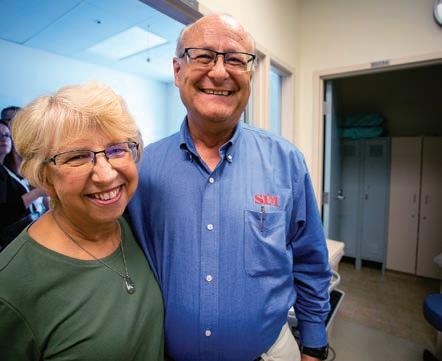
RIn August, Nancy Writebol, a missionary with SIM International, celebrated exactly five years of being healed of Ebola. She had contracted the virus during the 2014 outbreak while helping spray health workers with decontaminating bleach at Eternal Love Winning Africa (ELWA) Hospital in Monrovia, Liberia. On this anniversary of leaving the U.S. hospital where she received treatment, she made dinner with her husband David Writebol, sitting at the table in the same house in Liberia where she had been sick and isolated before her medical evacuation from the country. The Writebols talked almost laughingly about all they went through. They’re a cheerful, jocular couple with a long career in hard places. But certain memories still make Writebol cry. When she got out of the hospital, she was so thankful to be alive and Ebola-free that she was caught off guard by the way people treated her and her husband afterward. Close friends avoided her, fearful about Ebola. She carried an official letter declaring her to be a safe, noninfectious human being, but at one U.S. airport agents pulled her aside and brought out people in protective gear who said they were going to call in the Centers for Disease Control and Prevention.
“We were almost afraid to be seen because we didn’t know how people would respond to us,” said Writebol. “To this day it’s still painful.”
Soon after returning to Liberia with SIM in 2015, Nancy Writebol began work as a trauma healing facilitator for Ebola survivors in a country with the barest of mental health resources. She can identify with Liberians not only in terms of surviving Ebola, but also in having her home looted right after she was medically evacuated—something many Liberian survivors experienced.
Evangelical Church of Liberia Pastor Jeremiah Kollie works The Writebols at Emory University Hospital in Atlanta in August, five years after Nancy underwent treatment there for Ebola
with Writebol to lead trauma healing sessions and train facilitators. They point out they are not trained psychologists, but simply offer Biblical counseling resources.
“People can put on brave faces and pretend that all is well, but in their closets they are hurting,” said Kollie, who was displaced during Liberia’s civil war. “When you talk about what is deeply buried in your heart, that is healing. It’s able to equip you to face future challenges.” Kollie and Writebol use curriculum adapted for Liberia from the American Bible Society, offering what they say is the only Biblically based trauma healing in the country. The curriculum goes through basic principles of grieving, anger, and forgiveness, and then addresses specific situations such as domestic abuse, rape, or living in the midst of conflicts. Kollie helps too with cultural contextualization. The word “trauma” implies going mad to Liberians, so the facilitators use words like “heart wound.”
On ministering to women who have been raped, the curriculum says, “They should be allowed to say how angry and ashamed they feel. It is very common for rape victims to be angry with God. This is okay. God is able to accept their anger and still love them. It is better for them to be truthful about their feelings than to hide them.”
Kollie and Writebol have led healing sessions with rape victims, the paramilitary, the police, firefighters, children orphaned by Ebola, and men who worked in the national crematory during the Ebola crisis.
The crematory group had to take infectious bodies from families and burn them instead of giving the traditional washing and burial. Because those men did something culturally horrific, they felt the full stigma of the country while also occasionally coming across the corpses of people they knew. Their work felt like a “crime,” Kollie said.
Many of the crematory workers turned to alcohol and drugs to cope. When Writebol and another
Evangelical Church of Liberia pastor hosted the first trauma healing group with them soon after the crisis ended, she could tell the men weren’t ready to discuss what they had been through. She told them to call her when they were ready. A year later, they did, and went through the entire program. Some are doing well now, although one that Writebol knows of is still struggling and drug-addicted.
The trauma groups often lead to a discussion of other needs. One girl, a junior in high school, came through their trauma healing program after losing both of her parents to Ebola. A friend of the girl’s family had taken her into his home, but the man ended up impregnating her. The trauma healing group provided counseling resources to her as she had the baby and graduated from high school. She wants to go to A medical worker in Monrovia, Liberia; healthcare workers transport a body for burial (below).
nursing school but will have to find tuition money.
Kollie and Writebol already have so few resources that it’s difficult for them to meet such needs. Resources are especially slim now that SIM has appointed Writebol the head of its global trauma healing initiative, which takes her to trainings around the world. When the European Union had offered a grant of 750,000 euros for trauma healing in Liberia, the SIM team wrote a proposal. But Writebol said the EU cut their application. “We didn’t address how global warming affects trauma,” said Writebol with a wry smile. “So they said, ‘We’re sorry, but you’re not being considered.’ … Who writes a grant based on global warming affecting trauma?”
Kollie acknowledges the deep traumas of war and Ebola and notes that forgiveness is the biggest issue they work through in the group sessions. But he also emphasizes the trauma of everyday life in one of the poorest countries in the world, where economic opportunities seem out of reach for average residents. “The war has come and gone. We stay struggling,” said Kollie, noting the regular hopelessness Liberians feel. Many believe that politicians have betrayed them and will probably betray them again. “[The trauma initiative] has allowed people to express their hurts and take their pain to the cross, where they find healing.” A
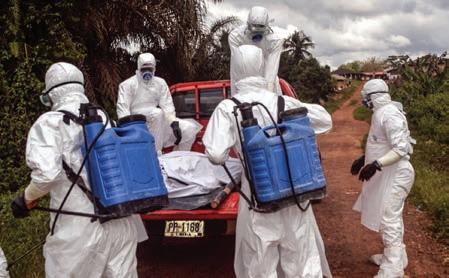
Lifestyle Two mended hearts FORGIVENESS ENABLED KATHI AND HAL HIGLEY TO HEAL FROM TRAUMA AND AN AFFAIR by Charissa Koh
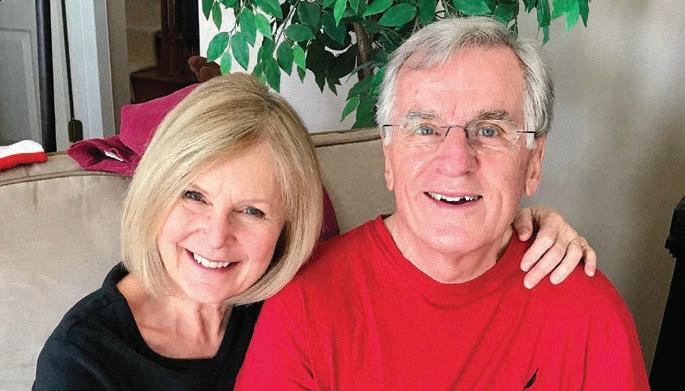
(Third in a series on long marriages.)
RIn 1986, Hal Higley found a letter addressed to his wife in the mail. When he asked Kathi, she said it was from a friend in Louisiana, but their strained marriage had left him suspicious. Later, as they put their three kids in the car to go to dinner, Hal slipped inside to search for the letter and found it hidden in a drawer. When he read it, he said, his “whole world fell apart.” The letter was from another man.
Hal and Kathi had been married 18 years. Her father had abused and raped her, so Kathi entered the marriage expecting Hal to rescue her. Hal’s authoritarian father and military experience influenced him to control everything in the marriage: balancing the checkbook, paying the bills, putting gas in the car— and even how many children they had. Over time, Kathi became miserable and resentful toward Hal. When the Air Force sent him to Greenland, she anticipated “a year of freedom.” Instead, managing the three young children and the tasks her husband usually handled made things even harder. On top of that, someone broke into their house, and a tornado damaged their property. Hal returned with no idea how hard things were for Kathi.
Something else was different when he got home: Kathi had started dating another man. When the Higleys moved from Louisiana to New York, Kathi and her lover secretly kept in touch by mail. That’s when Hal found the letter. The couple went to a chaplain for counseling, to little effect. Hal prayed, argued with Kathi, and lost 15 pounds from the stress. Eventually, he told her to return to Louisiana and decide if she would stay in the marriage.
Kathi agreed, feeling angry that Hal had found the letter but also convicted that the affair was wrong. The decisive moment came in Louisiana when the Christian friend she was staying with told her, “Go home. Your husband loves you.” Kathi said it took the friend being “brave enough to say that to me. ... I knew that was the truth.”
Hal remembers picking up Kathi at the airport: She said she had decided to stay in the marriage, but her expression said she wasn’t happy about it. Hal wondered, “How do I put this all back together again?” He started by getting their family into a good church, something they had not prioritized during all their military moves, despite being Christians. Kathi remembers Hal chose to love her, despite her unkindness. She said, “The biggest thing that he did was he never brought it up again.”
Through their church, Kathi took a 12-week class about dealing with the past. The next-to-last chapter was on forgiveness: “I knew I’d come a long way, and I knew I had to forgive my parents, but I just wasn’t there,” said Kathi. So she took the class again. At the end of the next 12 weeks, she could forgive her abusive parents. As Kathi understood God’s forgiveness, she stopped holding things against Hal: “I really fell in love with my husband.” They began to enjoy talking and spending time together. Others observed the new joy in their marriage and asked what they were doing differently. The Higleys were eager to help. They started a marriage ministry in 1998.
Last year they celebrated 50 years of marriage. They live in Virginia, near some of their grown children and 11 grandchildren. “It wasn’t all roses,” Hal says, “but I can’t imagine a better situation now, loving my wife more, or any marriage that’s any better than ours.” A
“Kid-friendly curriculum works at your own pace! Elizabeth “ I have a Ph.D. in New Testament and Greek and have taught Greek at the seminary level. When my lovely homeschooling wife found the Hey Andrew curriculum, I was DELIGHTED! My kids love Greek. Even my two year old walks around the house singing her Greek alphabet. Dr. Dan Wilson

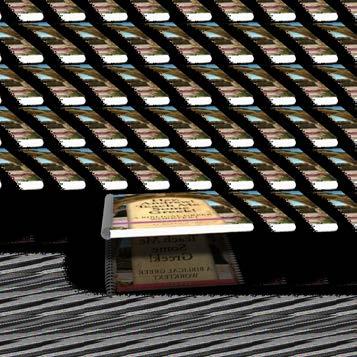
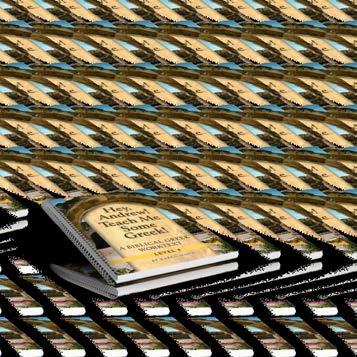
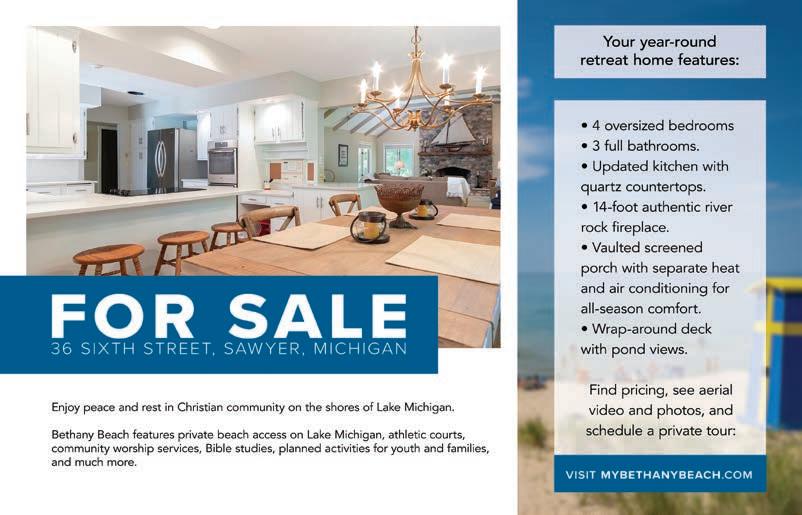

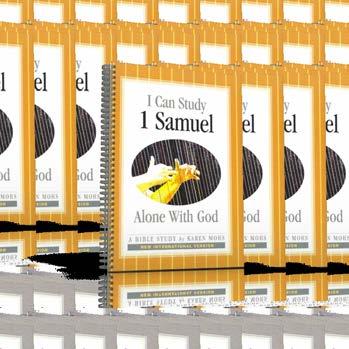
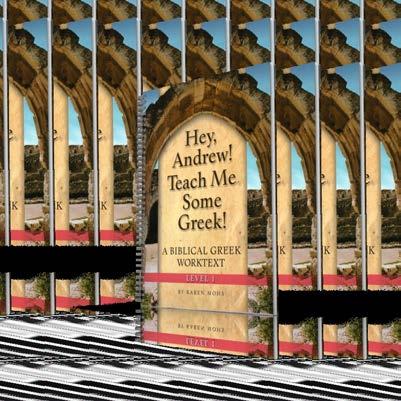

FREE catalog a v ailable
Pulling back the curtain [ Aug. 17, p. 32 ] Regarding this excellent article about company CEOs who signed the “Don’t Ban Equality” ad, it’s interesting that Kristin Hull saw no downside to signing because she “wouldn’t want to work with” people who don’t share her values. Does she consider her stand any different than declining to bake a wedding cake for a same-sex couple?
—JEANENE BURNS / Clarksville, Ark.
Pressuring women [ Aug. 17, p. 37 ] The comment that fatherhood rarely interrupts men’s careers does not sit well with me. I have given up many opportunities in my career because they would have hurt my family, and so have many other fathers.
—PHILIP COYLE / Hazle Township, Pa.
Leaving hate behind [ Aug. 17, p. 42 ] Thank you for this enlightening insight into the formation of people who join hate groups. I will add this to my prayer list. Sophia Lee is a treasure.
—KATHLEEN BARRETT / Gaston, Ind.
I never tire of reading about how the Lord changes people’s hearts in truly radical ways. Often, we get to be part of that change through relationships.
—ALISON TWEED AGNEW on Facebook
The fact that the mainstream media sensationalize and exaggerate racism doesn’t mean it doesn’t exist. I’m glad that WORLD faces the facts.
—MICHAEL PREWITT on Facebook
Good timing, given the recent shootings. Thank you for reporting honestly while reminding us of our hope in Jesus, who can change hearts and minds no matter how twisted!
—BETSY WILLIAMS on Facebook
Lee skillfully showed how only the love that enables us to honor the image of God in our enemies heals the festering wound of racism.
—BRENDAN BOSSARD on wng.org
This timely article helps us steer the discussion toward genuine Christianity, which stands firmly against white supremacists who twist Christian terminology to their own ends.
—DANIEL McPHEARSON on wng.org
Back to basics [ Aug. 17, p. 56 ] I thank God for giving Josh Boehr the courage to deconstruct the youth ministry at his church. As a public-school educator, I get worn down by the pressure to keep kids “engaged” when there is little pressure on the kids to listen and learn. Thank you, once again, for letting me know I am not alone in this upside-down world.
—LEE TAYLOR / Dade City, Fla.
Maybe if leaders communicated our relationship with Christ instead of manufacturing fun or drumming rules into people, they would know how wonderful He really is.
—GWEN RUSHING on Facebook
There should be a balance. We had fun in my youth group, playing crazy games and hanging out with friends, but my youth pastor was also serious about discipleship and led in-depth Bible studies.
—ANNA STEWART on Facebook
As they get older, the youth in this article will probably be better able to integrate into their church than many who can’t make the shift from fun and games to a sanctuary full of adults.
—MARK & KIM NEWHOUSE on Facebook
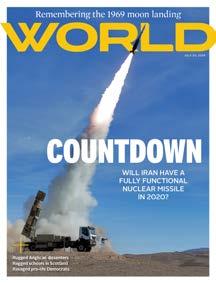
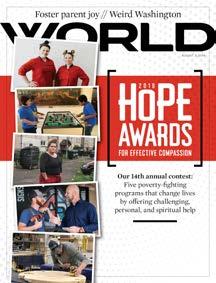
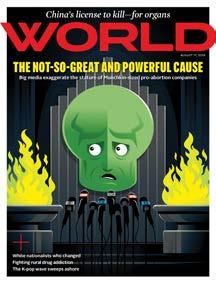
We have taken this approach at our small church for the last decade. We have a vibrant, God-loving youth group that is an integral part of our ministries, from greeting to community outreach to reaching out to shut-ins. We are very blessed.
—NANCY SCHROEDL KRIZAN on Facebook
Too often ministry leaders take their cues from what others are doing rather than looking to the simplicity of the Scriptures.
—CLIFF STOLTZFUS / Cochranville, Pa.
Selected specks [ Aug. 17, p. 16 ] Bill Nye the “Science Guy” might consider himself a mere speck who “sucks,” but I am fearfully and wonderfully made.
—MICHAEL SMALL / North Brookfield, Mass.
These are timely thoughts as we plan a trip to far west Texas, far away from any cities. There we’ll have ample opportunity to consider the works of His hands spilled across the dark sky each night.
—PENNY PALMORE BEATTY on Facebook
Human Race [ Aug. 17, p. 10 ] Josh Harris was devoured by our adversary the devil, and the rest of us should be of sober spirit and on the alert. Many professing Christians throughout history have made the same decision. Our hope is not on fallen men but in our sovereign God.
—LORENA SARUWATARI / Camarillo, Calif.
I’m saddened to hear the report about Harris. I can’t live the Christian life on my own either. As Paul wrote, “The life I now live in the flesh I live by faith in the Son of God.”
—A. (TED) BROWNE / Martinsburg, W.V.
Madcap mission [ Aug. 17, p. 19 ] Thanks for the honest review of The Red Sea Diving Resort. Boy, do I hate it when dumb, unnecessary distractions make people miss an important story.
—CHRISTY DAVIS NORDSTROM on Facebook
Off to college [ Aug. 17, p. 63 ] Excellent piece. It’s not just that Christian students in college bow to stronger intellects because they are unprepared, but that they bow to the spirit of the age because they lack spiritual wisdom. They don’t know they’re facing a battle, like the generation of Israel that was “unfamiliar with war.”
—SUZANNA PETERSON McDOWELL on Facebook
Woodstock won [ Aug. 17, p. 28 ] We celebrate with memoirs and festivals this highly revised history of the ’60s, all while the tentacles of its deconstruction continue to deceive and destroy us.
—INDIA TORNELL on Facebook
Who Killed Garrett Phillips? [ Aug. 17, p. 21 ] The botched investigation doesn’t surprise me. More than 50 years ago I went to college in Potsdam, N.Y., where Phillips was found strangled. Even then the students had a nickname from The Andy Griffith Show for the police: Barney.
—HEINRICH ERBES / McLean, Va.
Read more Mailbag letters at wng.org
The shape of fraud [ Aug. 17, p. 5 ] I agree that gerrymandering is political abuse. My congressional district is shaped like a huge U and crosses half of Arizona. Driving the entire district on the freeway with no stops takes eight hours. My congressman’s office is a four-hour drive from me, but I can still call him!
—KATIE LAMBERT on Facebook
LETTERS and COMMENTS Email mailbag@wng.org Mail WORLD Mailbag, PO Box 20002, Asheville, NC 28802-9998 Website wng.org Facebook facebook.com/WORLD.magazine Twitter @WORLD_mag Please include full name and address. Letters may be edited to yield brevity and clarity.

On making lists THE PRACTICE HAS ITS EARTHLY AND SPIRITUAL BENEFITS
RI’m a great believer in making lists. This is partly because I have a poor memory, and also because I think it is a good practice of a well-ordered life. My husband doesn’t make lists. Just saying.
I have a list on the refrigerator for groceries, with an asterisk near items not found at Aldi’s: faucet filter at O’Neil’s; mattress cover at Ambler medical supplies. I have a list on the counter for the day’s tasks that I wrote the night before: Bring broken microwave to township recyclables; take hamburger out of freezer; read book on Six-Day War; write essay; tell David I love him.
My kitchen calendar functions as a kind of list. It has people’s birthdays in red, and in regular ink the sundry commitments: Dad to foot doc; sympathy card for the Cnossens; Trans Wellness Conference downtown (see “A three-day circus” at wng.org). Last year I perused the box of calendars saved in the attic since 1985, hoping to jog my memory of the children’s childhood, but they were not very elucidating. Common entries: “J. to soccer,” “dog to vet.”
I have tried to convert my husband to making lists, but it’s evidently not his thing. He says it’s because he’s an ISTP, with borderline “S” and “P” scores, while I’m a strong ISTJ. That will mean something to Myers-Briggs personality test aficionados. For others, the gist is that I’m task-oriented while he’s a free spirit or something, I don’t remember exactly.
My mother was not warm (as I learned only as an adult from comparing notes with friends), but she made lists! Which put me in good standing for adulthood. If I had to choose only one of the two above-mentioned traits in a person raising me, I would be hard-pressed to forfeit the trait of organization for a little extra warmth. I turned out alright. … Didn’t I? (Insert Gary Larson cartoon of deranged three-eyed monster here.)

Once in middle age I said to my mother, “Ma, do you realize that all my life you have asked me to remind you to do this or that—pick up milk, mend a sock—and I have never once done it?” “It’s OK,” she consoled. “Just saying it out loud helped me remember—plus I make lists.”
There are certain kinds of lists God solemnly proscribes—to wit, the collecting of other people’s sins against us. Sometimes when we are aggrieved and inclined to inflict pain, we may find ourselves mentally building a case against the offending party. If that offending party is a sister or husband, we may have amassed a lengthy scroll: “You slept on the train the whole way from Seoul to Pusan on our wedding day and left me to ponder the wisdom of what I had just agreed to.”
This kind of listmaking has to cease and desist, if for none other than the practical reason that the fellow human in your personal defendant’s cage may have gathered a list of his own even thicker than yours, and more importantly that the ledger in heaven with your name on it may far outweigh your petty gripes (Matthew 18:21-35). There is no getting around the plain English of the following: “If you do not forgive others their trespasses, neither will your Father forgive your trespasses” (Matthew 6:15).
The best list I ever drew up was one day when I got so fed up with a defeated area in my life that I sat down and wrote the specific sins on paper; then brutally examined my heart for what desires were being frustrated (James 4:1); then brainstormed the Bible for what it prescribed on the subject, and jotted the verses. I drove with the paper to the cemetery, located the most remote spot, knelt down, spread the sheet on the ground before God, raised hands upward, and confessed them, seeking forgiveness. I followed this with concrete resolutions to God (Psalm 116:18) to not persist in these sins, by the dearly purchased grace of Christ.
I like the short list Evan Roberts went around Wales exhorting Welshmen to in the 1904 Revival: “Confess all known sin; get rid of everything doubtful; obey the Spirit immediately; proclaim Christ publicly.”
Hard to improve on a list like that. A
Vanishing dance LESSONS ON THE DECLINE OF LIBERAL JUDAISM
RRosh Hashanah, the Jewish New Year’s Day, begins this year the evening of Sept. 29. Some synagogues and temples will be crowded the way churches are on Easter, but most won’t have many worshippers on a typical Sabbath.
Do those who don’t know history repeat the errors of others? A book published 85 years ago—Jewish Theological Seminary professor Mordecai Kaplan’s Judaism as a Civilization— led many Jews away from Judaism. Books with similar themes today are undermining Biblical Christianity.
Kaplan before World War II went on speaking tours, praising Judaism as a fine result of natural human development rather than divine inspiration. He said the Hebrew Bible was not God’s Word, merely a key document in the evolving religious civilization of the Jewish people. Noah’s flood was not a mega-drowning but a writer’s device to get our attention. Exodus was a work of fiction rather than an actual history of liberation from bondage.
Kaplan said young people were abandoning a Judaism based on the supernatural, for they did not find Biblical accounts believable. For the sake of the children, professors should present the Bible as merely “ancient religious folklore … there would be once and for all an end to that mental conflict which has alienated Jewish youth from their religion.”
Kaplan taught that the Bible is not special: “Beliefs similar to those found in the Bible about God arise among all peoples at a certain stage of mental and social development. … The truths established by the various sciences of human nature and history no longer permit us to concede that Israel received a type of revelation or communication that was outside the order of nature.” For the sake of the children, Jews should view Darwinian evolution as not only true but joyful: “The Darwinian conception of the descent of man from the lower animals … holds forth the promise of man’s evolving into a much higher type of being than he is now. Man has so
far transcended his original animal nature as to possess reason and spirit.”
After World War II, many Jews learned of the Holocaust and saw incredible tragedy, but Kaplan saw man still progressing toward “the eventual dominance of his rational and ethical sense over his sensual appetites and savage lusts.” He published a complete siddur (prayer book) that omitted references to basic Jewish doctrines. A supernatural God who hears prayers? Gone. God punishes evil? Gone.
Orthodox rabbis vehemently disagreed. They called Kaplan a heretic and agreed “to excommunicate him and to separate him from the community of Israel until he fully repents.” Some publicly burned a copy of Kaplan’s prayer book in a New York City hotel.
Kaplan pushed back by starting within Judaism a “Reconstructionist” strain that amounted to a doughnut faith: Doughy but with a hole in the middle, where theology should be. Kaplan’s son-in-law, Ira Eisenstein, reported that the great professor at prayer times “would put on tallis [prayer shawl] and tefillin [phylacteries] and read from John Dewey,” the progressive sage. Kaplan also published TheNew Haggadah for the Pesach Seder. (A haggadah is a prayer book used at Passover meals.) It was “new” because it minimized the miracles of the Exodus story, but it apparently did not become new enough. Now a trip to Amazon.com or other sites yields titles like Haggadah for Jews & Buddhists, A Hip Hop Haggadah, The Hyper-Modern Ancient With-It Traditional Haggadah, the Love and Justice in Times of War Haggadah (for LGBT users), and the punny Haggadah Good Feeling About This. The forecast of the Orthodox rabbis was right. Kaplan’s “Reconstructionism” did not satisfy. The sect still has a minor presence in Judaism, but most rebels against Orthodox Judaism did not get off at the Reconstructionist bus stop. One of my cousins became a Jubu, trying to meld Moses and Buddha. Many became atheists. Some, surprised by Christ, became evangelicals (like me) or—like Robert Novak and Hadley Arkes—Catholics.
Today, millions who grew up in Christian homes are asking: What difference does the Bible make? We might think the way to hold onto them is to say, “Not much. Believe in evolution. Have an abortion.” That’s Biblically wrong, of course, but—judging by the Jewish experience—it’s also impractical. Judaism’s disappearing numbers teach that expecting faith, while lacking a theological core, is tap-dancing in the air. A
